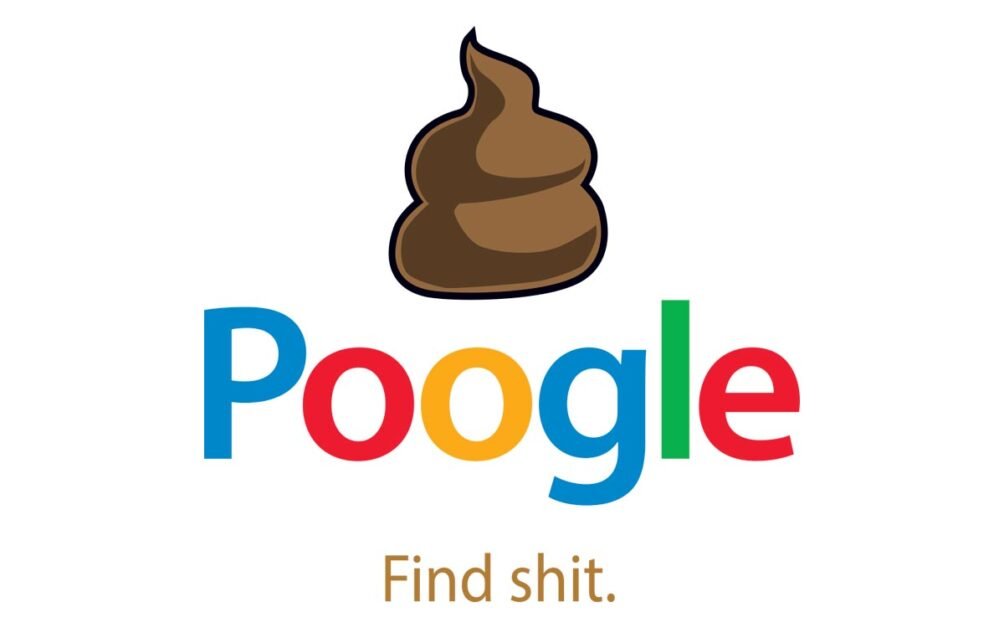Recently, I posted a new T-shirt design on TeePublic, a site that offers artist designs on T-shirts and other items. The design (above) is a parody of a certain popular search site that rhymes with Boogle.
I think it’s pretty funny, not to mention true.
Unfortunately, the soulless automatons at Koogle were not pleased, and I received an email from TeePublic informing me the design was removed at Noogles request, claiming the design… get this… violated intellectual property.
Aaaw! Did I hurt the wittle Borg’s feewings?
Perhaps Doogle should take a minute and use their product to look up the legal protections for parody in the United States. If so, they will soon discover that my design is easily recognized as a parody commenting on the crap that a certain evil corporation foists on hapless users who haven’t been told about DuckDuckGo.
The email sent by TeePublic requested that I reply if I think their decision is in error.
I replied with a brief note (see below) explaining what parody is and including quotes from legal sources making clear how the FAIR USE EXCEPTION and FIRST AMENDMENT protect commentary and criticism via parody, and how my design fits neatly into that definition.
I’m sure Lougle (Hot Tub Time Machine reference!) will in the end get what it wants. After all, Voogle is bigger than me. TeePublic surely knows what Woogle – evil behemoth that it is – is capable of doing to those who irritate it, so I won’t be surprised to see them maintain the ban on my design.
Regardless of what happens, I’ve already proven that my creation is not just a funny design. It speaks a valuable truth. A TRUTH this evil corporation has revealed by its own actions to ban it:
Google is shit.
Here is the note I sent to TeePublic in response to removal of my Poogle design:
I believe my design is NOT an infringement of Google's intellectual property, nor is it a violation of their copyright.
The design is an original piece of art created as a parody, and falls within the FAIR USE EXCEPTION as a form of commentary on and criticism of Google and as such is protected by the FIRST AMENDMENT.
I realize that Google is the five hundred pound gorilla in the room, but their claim of intellectual property violation is easily refuted with just a few minutes' search on DuckDuckGo.
Here is what the Cornell School of Law has to say about parody (source):
"A parody takes a piece of creative work–such as art, literature, or film–and imitates it in an exaggerated, comedic fashion. Parody often serves as a criticism or commentary on the original work, the artist who created it, or something otherwise connected to the work. In the United States, parody is protected by the First Amendment as a form of expression. However, since parodies rely heavily on the original work, parodists rely on the fair use exception to combat claims of copyright infringement."
FindLaw has this to say about parody (source):
"It has been a long-standing practice to poke fun at our cultural icons, symbols, public figures and celebrities. A parody exists when one imitates a serious piece of work, such as literature, music or artwork, for a humorous or satirical effect. Parody, as a method of criticism, has been a very popular means for authors, entertainers and advertisers to communicate a particular message or point of view to the public.
"A parody, because it is a method of criticism, must inevitably make use of another creative work. This inherently creates a conflict between the creator of the work that is being parodied (as no one likes to be criticized, made fun of or ridiculed) and the creator of the parody. It is also highly unlikely that a copyright owner will grant permission or a license to a parodist to use their copyright protected work in creating a parody.
"Since copyright law prohibits the substantial use of a copyrighted work without permission of the copyright owner, and because such permission is highly unlikely when the use is to create a parody, it may be necessary for the parodist to rely on the fair-use defense to forestall any liability for copyright infringement. However, the fair-use defense if successful will only be successful when the newly created work that purports itself to be parody is a valid parody.
"Another line of defense that may be available for parodists are the free speech principles incorporated in the First Amendment."
It is possible that you may in the end bend to Google's will and remove my design from your site (it's your site after all), but please don't pretend that Google's claim is in any way legitimate.

About the Author
Topdog is Steve Merryman, a retired graphic designer, illustrator, and unrepentant asshole. Steve can usually be found working on a portrait commission or some other artwork. Steve fills his days by painting, writing, shootin' guns, cuttin' trees, hiking with his dogs, and savoring a beer or two, all while searching for the perfect cheeseburger. He studiously avoids social media and is occasionally without pants.



Comments 4
Wow, this is clearly parody, and a good one, too, even better than Wacky Packs. I’d do what I could to make them look silly.
Because they are silly. I’m sure the /chans/ would have fun with this . . .
Author
And you know what’s really silly? I have the same concept with slightly different colors on a black shirt with TeePublic, and it’s still up.
We saw this day coming….sat on our hands (literally, kept our mouths shut)…and did nothing. “Freedom of Speech” is ONLY what we are willing to say knowing that our legal system may prosecute us and put us in cuffs for violating some ephemeral definition of “approved” speech.
Author
As the saying goes, “It ain’t over till the fat lady buys a t-shirt.”